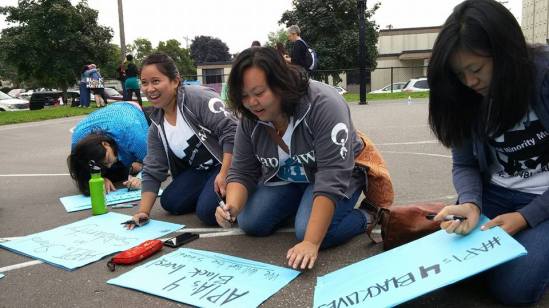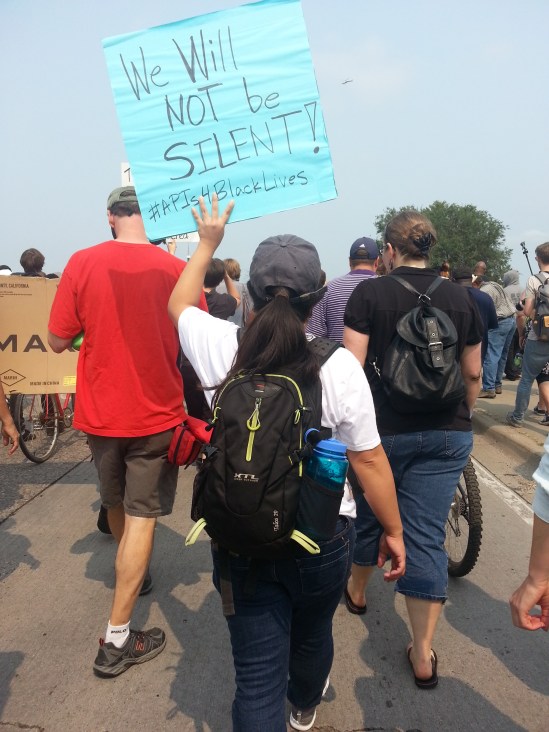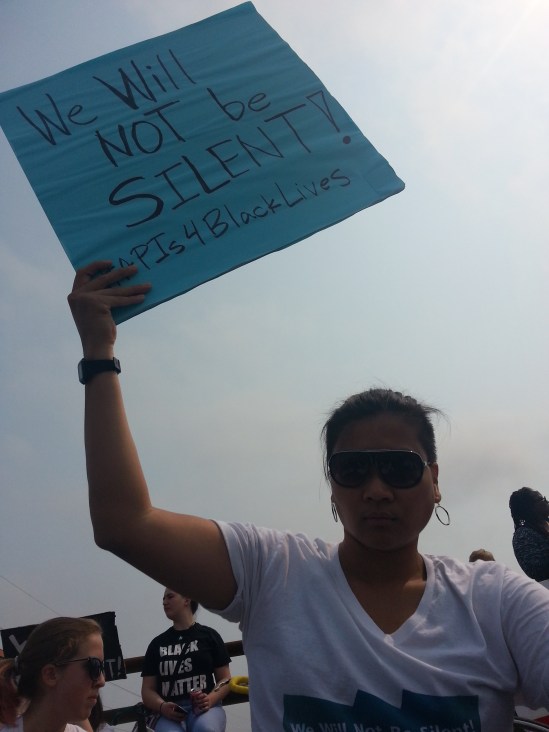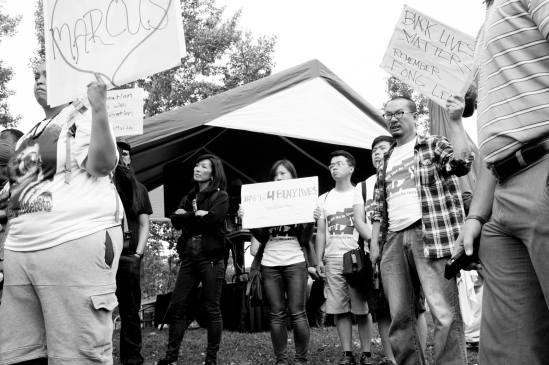I am a queer Hmong American refugee, whose shared experiences and encounters with white supremacist violence has compelled me to rise in solidarity with Blacks who are currently facing a very dire situation in this country. I am wondering, why are Hmong Americans not showing solidarities with Blacks? We see too often the anti-Black racism spewed out by members of our own communities and families, and we do nothing. We often hear our own friends say that Black people deserved to die, or that they are lazy, good for nothing, thugs. We are scared that our Black neighbors will beat us up or rob us at night. We live among Blacks in North Minneapolis, Frogtown, or East Side St. Paul, and we bash them for being bad neighbors. We are scared of living in the “ghetto” with them. Yet, not only do we fail at being good neighbors, but we have (un)consciously internalized anti-Black racism as well. I hear Hmong Americans around me justify police violence by saying Black people do not work hard enough, are loud and obnoxious, and are criminals, so they deserve to be shot.
 As we know by now, Black people are being killed all across the U.S. I have lost count of the number of victims. Furthermore, queer people of color, and especially Black transwomen, are much likely to be arrested, left homeless, and killed by police.But let me now focus on Sandra Bland, a Black woman who was arrested and died in police custody in Texas. I have no doubt that police murdered her. She was murdered because she was Black, and she was knowledgeable about police brutality. The police do not want us to fight back, to educate, or to rise up. Some Hmong are openly supporting police, and even justifying police use of force. Yet, these same individuals fail to explain the systemic ways Blacks are disproportionately facing police violence.
As we know by now, Black people are being killed all across the U.S. I have lost count of the number of victims. Furthermore, queer people of color, and especially Black transwomen, are much likely to be arrested, left homeless, and killed by police.But let me now focus on Sandra Bland, a Black woman who was arrested and died in police custody in Texas. I have no doubt that police murdered her. She was murdered because she was Black, and she was knowledgeable about police brutality. The police do not want us to fight back, to educate, or to rise up. Some Hmong are openly supporting police, and even justifying police use of force. Yet, these same individuals fail to explain the systemic ways Blacks are disproportionately facing police violence.
You may ask why Hmong Americans should care about this issue. I say, we must not forget our past. We too bear the brunt of white supremacist, colonial violence. We too were forced out of our homes and our lands. We too suffered death in warfare. We too were once being killed in the jungles with no one noticing or caring about our unjust deaths. It was a Secret War after all. As we remember Fong Lee, a Hmong teenager who was killed by a Minneapolis police officer, let us remember that we too have seen, feel, and known injustice in our communities.
 However, Hmong Americans also perpetuate anti-Black racism. In the early 20th century, Asian Americans tried to lay claim to legal citizenship through saying they are “white.” While this did not go in favor of Asian Americans, it shows how whiteness plays into the lives of Asian Americans. Many Hmong Americans are now millionaires or have secured high-level corporate positions. In this vein, we have been able to help other members of our communities. However, we must not allow ourselves to be tricked that we have all “made it.” We have achieved a level of success that perhaps puts us in line with other Asian Americans as model minorities, but we by no means have achieved racial or class justice. It is precisely because some Hmong have become model minorities that they see Blacks as lazy, obnoxious, and criminal, thus deserving death.
However, Hmong Americans also perpetuate anti-Black racism. In the early 20th century, Asian Americans tried to lay claim to legal citizenship through saying they are “white.” While this did not go in favor of Asian Americans, it shows how whiteness plays into the lives of Asian Americans. Many Hmong Americans are now millionaires or have secured high-level corporate positions. In this vein, we have been able to help other members of our communities. However, we must not allow ourselves to be tricked that we have all “made it.” We have achieved a level of success that perhaps puts us in line with other Asian Americans as model minorities, but we by no means have achieved racial or class justice. It is precisely because some Hmong have become model minorities that they see Blacks as lazy, obnoxious, and criminal, thus deserving death.
Let us not forget that all these achievement that we have made success in would not have been the slightest of our imagination if it were not for the struggles and successes of our former Black brothers and sisters in fighting for the rights to education, voting, and citizenship. These are things that Hmong Americans today in the US have taken for granted; thus, we need to be conscious in ways how the treatment of Blacks will reflect in the treatment of how Asian Americans will be treated in the future.
 The current movement around #BlackLivesMatter should inspire us. I have seen many Hmong fall into the trap of “#AllLivesMatter” or “#HmongLivesMatter.” By doing so, we either enhance white supremacy, or we fall back to centralizing Hmong lives, and thus fail to be allies to other communities apart from our own. At the current moment, we see that Black lives are being taken from us on a near daily basis. There was a time when Black people were only considered 3/5 human, not fully human. That should teach us that Black lives were never considered lives to begin with. Many Hmong Americans are ignorant or indifferent to the histories of slavery, segregation, and lynchings that Blacks know all too well. Some institutions such as the prison and the police are born out of slavery and racism. Blacks and people of color make up the overwhelming majority of people in prison, while the crimes they commit may actually be the most petty. We must dismantle and constantly criticize these institutions of power, although sometimes they may seem like they exist to uphold law and order in society.
The current movement around #BlackLivesMatter should inspire us. I have seen many Hmong fall into the trap of “#AllLivesMatter” or “#HmongLivesMatter.” By doing so, we either enhance white supremacy, or we fall back to centralizing Hmong lives, and thus fail to be allies to other communities apart from our own. At the current moment, we see that Black lives are being taken from us on a near daily basis. There was a time when Black people were only considered 3/5 human, not fully human. That should teach us that Black lives were never considered lives to begin with. Many Hmong Americans are ignorant or indifferent to the histories of slavery, segregation, and lynchings that Blacks know all too well. Some institutions such as the prison and the police are born out of slavery and racism. Blacks and people of color make up the overwhelming majority of people in prison, while the crimes they commit may actually be the most petty. We must dismantle and constantly criticize these institutions of power, although sometimes they may seem like they exist to uphold law and order in society.
To stand with #BlackLivesMatter does not mean we are against other lives. In fact, part of social movements and social justice is to validate and truly understand the suffering of others that you yourself do not experience. With that, we must believe in and stand beside, and be engaged with #BlackLivesMatter. Until Black lives matter, we truly cannot uphold the value that all lives matter.
I am by no means saying that we must divert the attention to Hmong American communities. In fact, I am saying the opposite. We must understand our position as Hmong Americans in this country, in order to understand how we have benefited at the expense of Blacks. We also perpetuate hate against other communities, who are classed, gendered, sexed, or raced differently from us. To say that Hmong Americans exists outside of Blacks is completely wrong and ignorant. We have benefited from decades of civil rights and social justice struggles by Blacks, American Indians, Latinos, gays, lesbians, trans, and other Asian Americans. We share the experience of racism, death, war, and racial stereotyping with Blacks, and we cannot and should never forget this. We must let go of our own anti-Black racism and prejudices and we must truly understand that Black lives matter. We can do something!
[This article was published as MidWest Solidarity Movement’s stance on supporting #BlackLivesMatter]
More images from #API4BlackLives at #BlackFair:
Video from API4BlackLives @ #BlackFair:
About the author:
Former MidWest Solidarity Movement collective member, Kong Pheng Pha is a PhD candidate, historian, and researcher at the University of Minnesota. His research interests lie at the intersections of race, class, gender, sexuality, queerness, and refugee migration. His activist work centers around these topics, and he has presented his research and activist experiences all over the U.S.













You couldn’t have said it any better. It’s sad that hmong people do not see what black people have done for us. They fought for everyone’s freedom and rights so we can live equally and be treated equally. I hear left and right from my hmong brothers and sisters about their encounters with racism; yet, they are the ones going around calling black people the most horrible words there are in the book.yet are literally right along side with the white supremacists. I truly hope that one day from young to the old understand why we are able to live our lives almost comfortably.